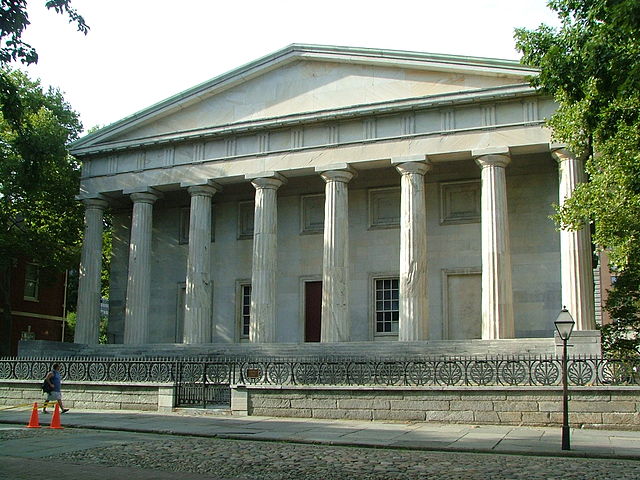
Today, it seems that having a central bank is a necessity for almost all nations, industrialized and developing alike. While the existence of the Federal Reserve may now be taken for granted, an investigation into the history of national banks in the United States reveals a legacy of intense debate and political struggle.
Perhaps the seminal episode in this saga was McCulloch v. Maryland, a case decided on March 6, 1819, dealing with the Second Bank of the United States, constitutional restraints on federal power, and the nature of American federalism.
The First Bank of the United States, an effort spearheaded by Alexander Hamilton, was established in 1791 as a way for the federal government to deal with Revolutionary War debt and stabilize currency. After its charter expired in 1811, Congress failed to reauthorize the bank, but a renewed interest in a national bank emerged after the War of 1812. As an effort to again manage war debt and rising inflation, President James Madison signed a bill in 1816 creating the Second Bank of the United States.
Jeffersonian Republicans fervently opposed the bank’s formation, asserting both that it exceeded the powers of the federal government as outlined in Article 1 of the Constitution, and that it would create, favor, and maintain a powerful, wealthy upper class.
In an action understood by many to be a direct repudiation of the national bank, the state of Maryland passed a law in 1816 imposing a tax on all banks and branches not chartered by the state legislature. At the time, the Second Bank of the United States was the only bank operating in Maryland that fit the description and thus was subject to the tax.
James McCulloch, the head of the Baltimore branch of the national bank, refused to pay the tax. His defiance prompted a lawsuit that brought into question both the Maryland law and the authority of the federal government to establish the bank in the first place.
In a unanimous decision authored by Chief Justice John Marshall, the Supreme Court struck down the Maryland statute and affirmed Congress’ authority to establish a national bank. Opponents had pointed to Article 1, Section 8 of the Constitution, which explicitly enumerates the powers of Congress, and had argued that it did not include the power to charter a national bank.
Adopting a more lenient reading of the Necessary and Proper Clause, the Court explained that Congress has the power to enact legislation that aids the federal government in pursuing appropriate and legitimate ends. Even if a power is not explicitly granted to Congress under Article 1, Section 8, Congress nevertheless has authority to use other, non-enumerated means to pursue reasonable ends.
Chief Justice Marshall reasoned that one objective of the Constitution was to promote commercial development and prosperity throughout the United States, and that, since the establishment of a national bank was an appropriate means of achieving that end, Congress has the power to charter a bank. Unless a means to achieving legitimate ends is expressly prohibited in the Constitution, the questions involving issues like a national bank are "question[s] of legislative discretion, not of judicial cognizance."
After determining that Congress has the authority to charter a national bank, Marshall explained that the Maryland statute was illegitimate. Looking to the Supremacy Clause and the nature of our federalist system, Marshall wrote that “the States have no power, by taxation or otherwise, to retard, impede or in any manner control the operations of” enactments of Congress. Famously declaring that “the power to tax is the power to destroy,” Marshall struck down the Maryland law as an illegitimate state impediment to legitimate federal operations.
As one of the first decisions that legitimized a broader understanding of federal powers and underscored the supremacy of the federal government, the lasting influence of McCulloch v. Maryland cannot be overstated.
Many of Congress’ most consequential actions, including regulations, safety-net programs, and civil rights protections, are not explicitly enumerated in Article 1, Section 8, and have been justified using the reasonableness standard established in McCulloch. And while the powers of states in relation to the federal government have waxed and waned over time, McCulloch established baseline constraints on how states can and cannot react to federal legislation and programs.
Jonathan Stahl is an intern at the National Constitution Center. He is also a senior at the University of Pennsylvania, majoring in politics, philosophy and economics.







